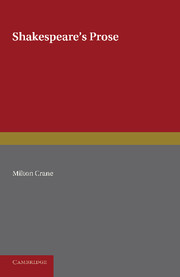IV - Shakespeare: The Comedies
Published online by Cambridge University Press: 05 June 2016
Summary
In prose, comedy finds a medium in which it can easily and naturally express itself. Verse implies tension, pattern, formalism; prose, freedom and relaxation. Verse is the proper vehicle for high passion; prose, for rational discussion and calm resolution. The tragic problem culminates in action; the comic problem, in words.
It is, therefore, altogether just that Shakespeare should have employed prose extensively in his comedies from the outset of his career. Prose occupies one-fourth to one-third of the text of the early comedies, but it grows steadily in bulk and importance until it reaches a somewhat dubious apogee in The Merry Wives of Windsor, in which the verse is on all counts virtually insignificant. The late comedies show a decline in the quantity of prose, but the form loses nothing of its special function or value.
Henry W. Wells has argued cogently in his “The Continuity of Shakespearean Prose” for a conception of Shakespeare's prose as a mature, fully realized medium from the earliest plays onwards. The verse style, according to Wells, undergoes constant development throughout Shakespeare's career; but the prose of Launce is already rich and mature. One can hardly deny that Wells is correct in challenging the lay reader to assign a given prose passage from Shakespeare to the early, middle, or late portion of Shakespeare's career; a similar experiment with a passage of verse would be palpably less difficult.
Is not the explanation of this continuity to be found in the debt of Shakespeare's prose to the colloquial speech in which it is rooted? This element of everyday life, expressing itself largely in the realism of comic prose and thus affecting not only the medium but the employment of that medium in the Elizabethan drama, remains a constant from The Two Gentlemen of Verona to The Tempest. When, with Wells, we praise Shakespeare for his early maturity in the writing of prose, we are in fact saying that he was able from the beginning- to make effective use of his observation of life in Elizabethan England. Nor are we dispraising his verse in thus praising his prose; no one is likely to deny that a poet requires full maturity in life and in art for the creation of King Lear.
- Type
- Chapter
- Information
- Shakespeare's Prose , pp. 66 - 127Publisher: Cambridge University PressPrint publication year: 2013

